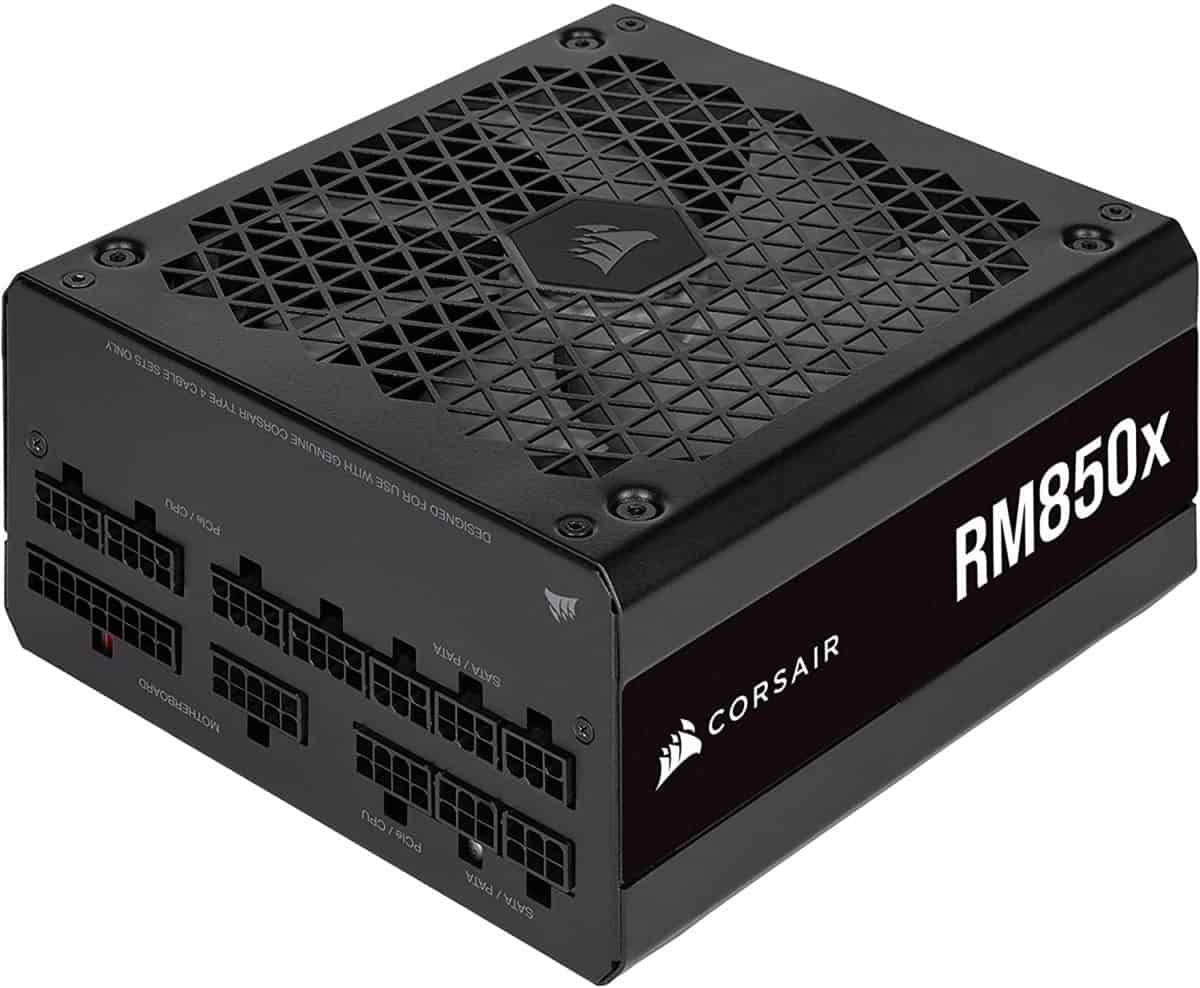Best power supply for RTX 3080 and 3080 Ti
With some great opportunities to grab some reduced GPUs so you may be wondering which power supply will match their power
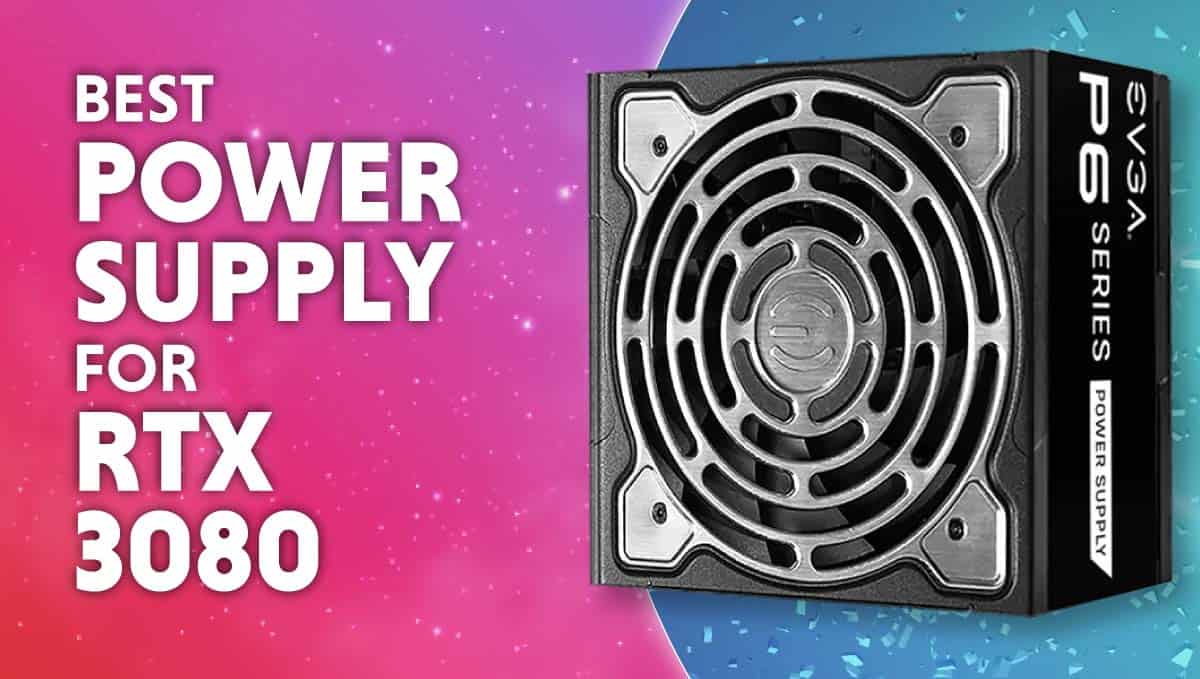
WePC is reader-supported. When you buy through links on our site, we may earn an affiliate commission. Prices subject to change. Learn more
If you’re thinking about upgrading or buying your next best graphics card you may have to consider a powerful power supply. Therefore we look for the best power supply for an RTX 3080 or an RTX 3080 Ti. In case you don’t know the difference you can read up on the RTX 3080 vs 3080 Ti. But with the ever-evolving power of cards, we also see the rise in their TDP. So these become greater space heaters as well as need a greater power supply to run them.
Especially a need for ones that are capable of dealing with transient loads. Good quality supplies can accommodate the potential spikes in power and the extra overhead of these GPUs. Now that the RTX 4000 series is out there, it is a great opportunity to grab a discounted 30-series card. But then you need a good PSU to support it and a good one at that.
So when it comes to having to pick out which PSU you want to pair with your new card there are a few factors you have to consider. There are considerations like budget, wattage, efficiency, noise levels, and ratings. With that let’s get into the best power supplies for your RTX 3080 and 3080 Ti and if you want some more options you can check out our sister site for some of more best PSUs for RTX 3080.
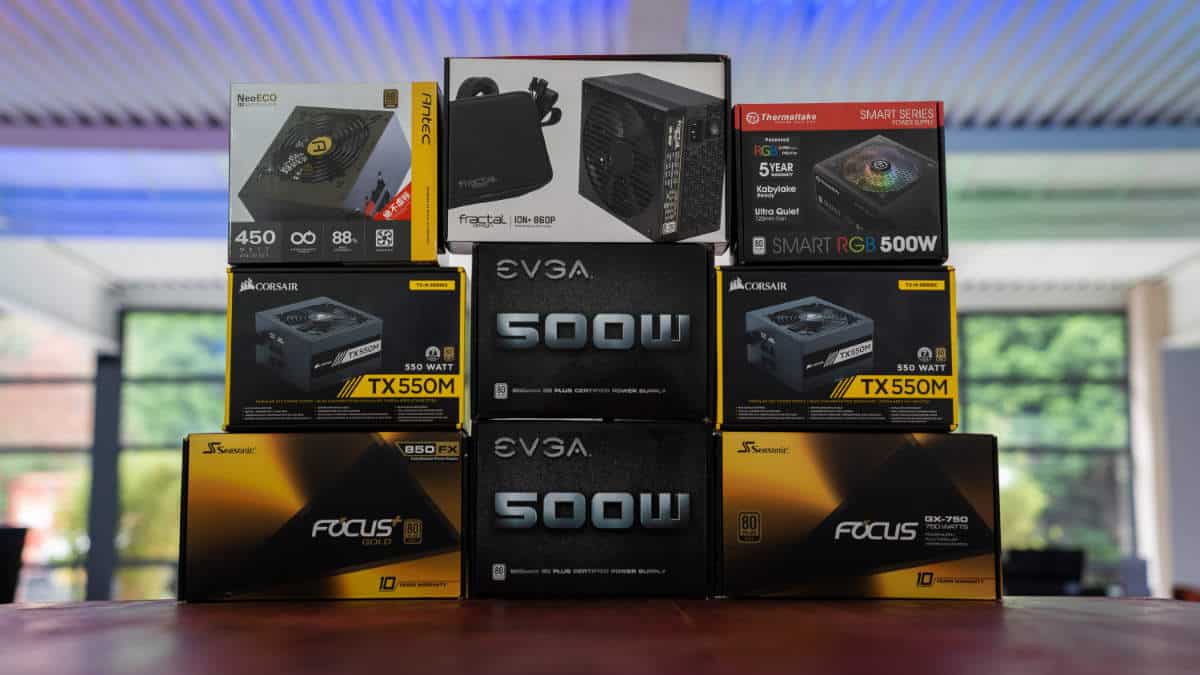
How we choose
When it comes to selecting the best power supply there is a lot of research and thought put into the process. With a look at what the most popular options are along with reviews to make sure the options live up to the standards.
Along with that, we consider the cost of them and if it’s the best option for the price. As well as considering if the wattage is substantial enough for the card it is being considered for. While there also is some thought of how loud the supply is either the fan running or coil whine it may experience.
There is a lot of balancing of what features are most important to the users in the end.
Best power supply for RTX 3080 and 3080 Ti buying tips
Trying to discern which PSU you want to buy can be a bit of a process and a hard thing to do. You might be questioning what all the different specs actually mean for you running the supply with your build.
Or wondering what you should focus on and what is the difference between the choices you have. To help with that we discuss and go through each important factor for picking out the right one.
Wattage
The first specification you want to look at is the Wattage of the power supply. This is how much power it can actually deliver in total. And for best results, you need it to match the recommended power from the GPU manufacturer or work out the total for your system.
When it comes to the best power supply for your RTX 3080 or 3080 Ti, we look to their TDPs and recommended power supply. As the graphics card is most likely the most powerful part it will dictate your power needs.
Now in terms of the 3080 cards, they have a power of 320 W for the 10GB version and 350W for the 12GB and Ti versions. But Nvidia recommends a system power of 750 W for all of them either way, based on an i9-10900k.
However, it’s more likely you’re going to be using a custom AIB rather than an FE card. Although based on the same card, their extras and overclocks tend to require more power. Therefore will often ask for a higher wattage supply. It also allows for that extra safety margin on top. Either from higher power rest of the build or the spikes your card matt use that need to be covered.
So in terms of the custom cards, they ask for a 100 W extra supply over the FE cards. So it’s preferential to have an 850 W supply to be on the safe side. As well as it being able to handle the spikes and extra loads it may encounter.
Modularity
Another factor to consider is if you want a modular power supply or not. This is a more premium and high-end feature. As it is more of a nice to have and not necessary if you’re more budget focused.
What it means is that the cables coming out of the power supply are replaceable and need to plug in. As with higher-wattage PSUs you tend to have more expansion options and you may not want to utilize all of them.
So if you have four or five PCIe ports on the PSU you may only need three cables so you can leave the others empty. This helps with cable management and keeping your build clean and so isn’t a necessary feature.
But there is also a semi-modular option that will have the necessary cables plugged into the PSU and is not replaceable. This will be the 24-pin ATX connector and CPU 8-pin but the rest you can fill into your own needs.
Whilst the cheapest budget options will have all the cables plugged in and not replaceable. This means you just have to deal with the whole bundle even if you’re not utilizing them all. It also means no options to customize your cable with afterparty options like in a fully modular supply.
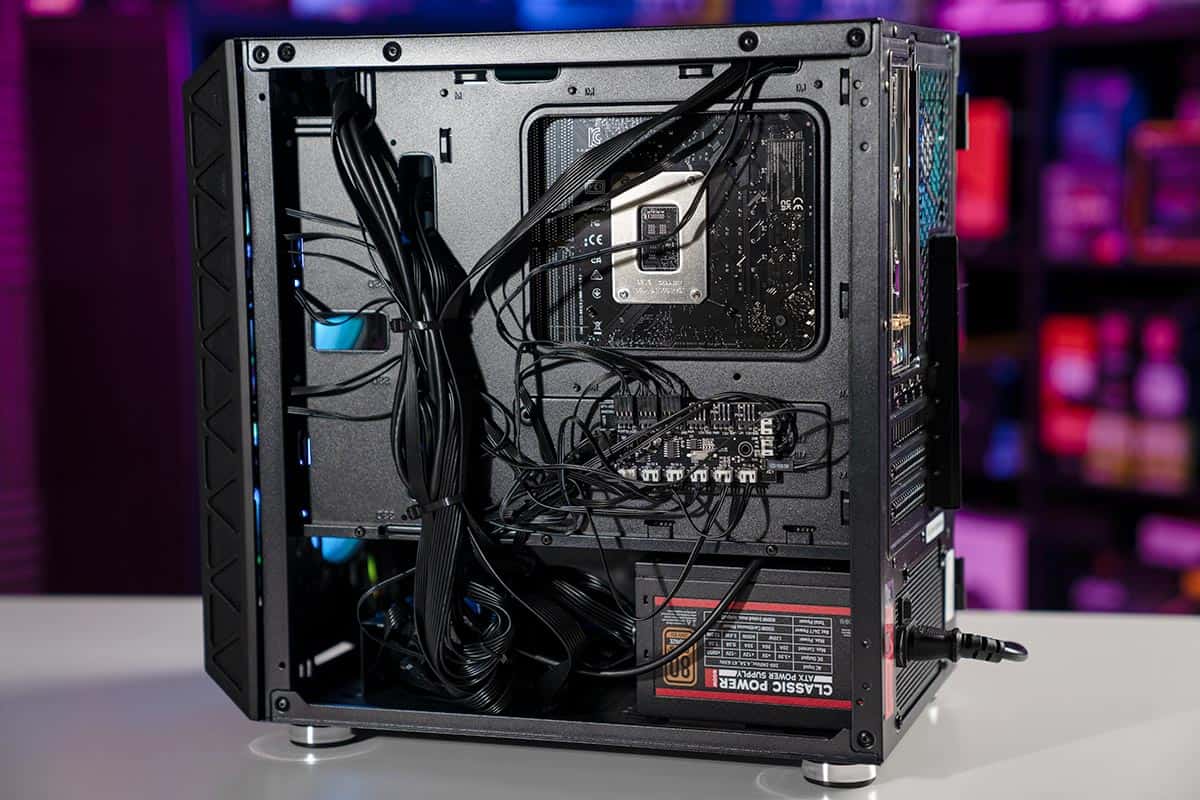
Efficiency
When it comes to power supplies there is a key part of them that can cost you a varying amount in terms of energy consumption. It is the efficiency of the conversion occurring inside.
What a power supply will do is convert the AC (alternating current) from your home’s circuits to DC (direct current) utilized by your components. As this is an imperfect job it does have some inefficiencies and will lose some energy as heat. Therefore to make sure you’re getting the most out of it you want an efficient PSU.
One way to easily identify the efficiency is through an 80 PLUS certification. Although its usefulness has been questioned more recently it can still be a good quick indicator. This company and certification check how efficient it is at different loads and for different voltages.
It ranges from 80 PLUS white, that is 80% above 20% loads on 115V non-redundant and 230V non-redundant, but no spec for 230 V internal redundant. All the way up to Titanium which has at least 90% efficiency across all loads. This obviously does increase the cost of the PSU but will be better at power management.
Although some have started to question the certification. With not enough or lacking methodology there have been other certifications on the way. One is Cybenetics which offers efficiency, noise level, and chassis certifications.
Fanless, hybrid, or full fan
One factor to consider is the situation with the cooling of the power supply. When doing the conversion work that inefficiency leads to heat output and that needs to be dealt with. And that heat will only increase with higher workloads.
So there are only a few options when it comes to the cooling solution in a power supply. You will either have a fan or not and then that fan may have a hybrid mode.
So a fanless, passive PSU will focus on more heatsinks and may end up more open and with mesh, as it increases the opportunity for air to come in a remove that heat. Whilst a fan can do that manually and push fresh air over the heatsinks to cool it down.
However, having a fan on can make the PSU noisier and not pleasant to use. So some do have the option for hybrid operation. This means the fan will only turn on at higher loads when it needs the extra cooling to keep up. And so it can help with noise reduction but can be a more premium offering.
Best power supply for RTX 3080 or RTX 3080 Ti: In-depth review
Corsair RM850x
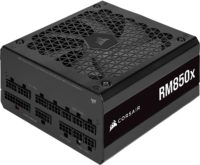
Wattage
850W
80 Plus certification
Gold
Modularity
Fully Modular
- Fully modular for customization and clean building
- Features maglev fan for the quietest and longest performance
- Hybrid mode keeps the fan off until its needed
- 10 year warranty to keep your PSU realiable and long lasting
- Can be a more expensive option
In the top spot for the best power supply for an RTX 3080 or RTX 3080 Ti, we have the Corsair RM850x. The 850 W PSU is 80 PLUS Gold rated fully modular and a popular choice among the community. It has connectors for 5x SATA/PATA, 1x motherboard, and 5x PCIe/CPU.
With its higher efficiency rating, you do know your energy usage will be put to good use. Although not the highest possible it doesn’t come with the premium those ratings tend to bring with them.
It is also fully modular, giving you the best choice of cabling. Either only use the ones you need to keep neat and tidy or being able to replace them with other colors for a more personalized touch.
Along with that, it features a 135mm maglev fan. With magnetic levitation there it is built to last with low noise and high performance. Whilst also comes with a zero RPM fan mode. The fan only turning only at 340W to keep as quiet as possible.
Along with 80 PLUS, this power supply is rated by Cybenetics. Another rising standard measures efficiency and noise levels. And this supply gets gold and standard++ for them. Along with this, there is a 10-year warranty on it in case you do have an issue come along with it.
EVGA SuperNOVA 850 GA
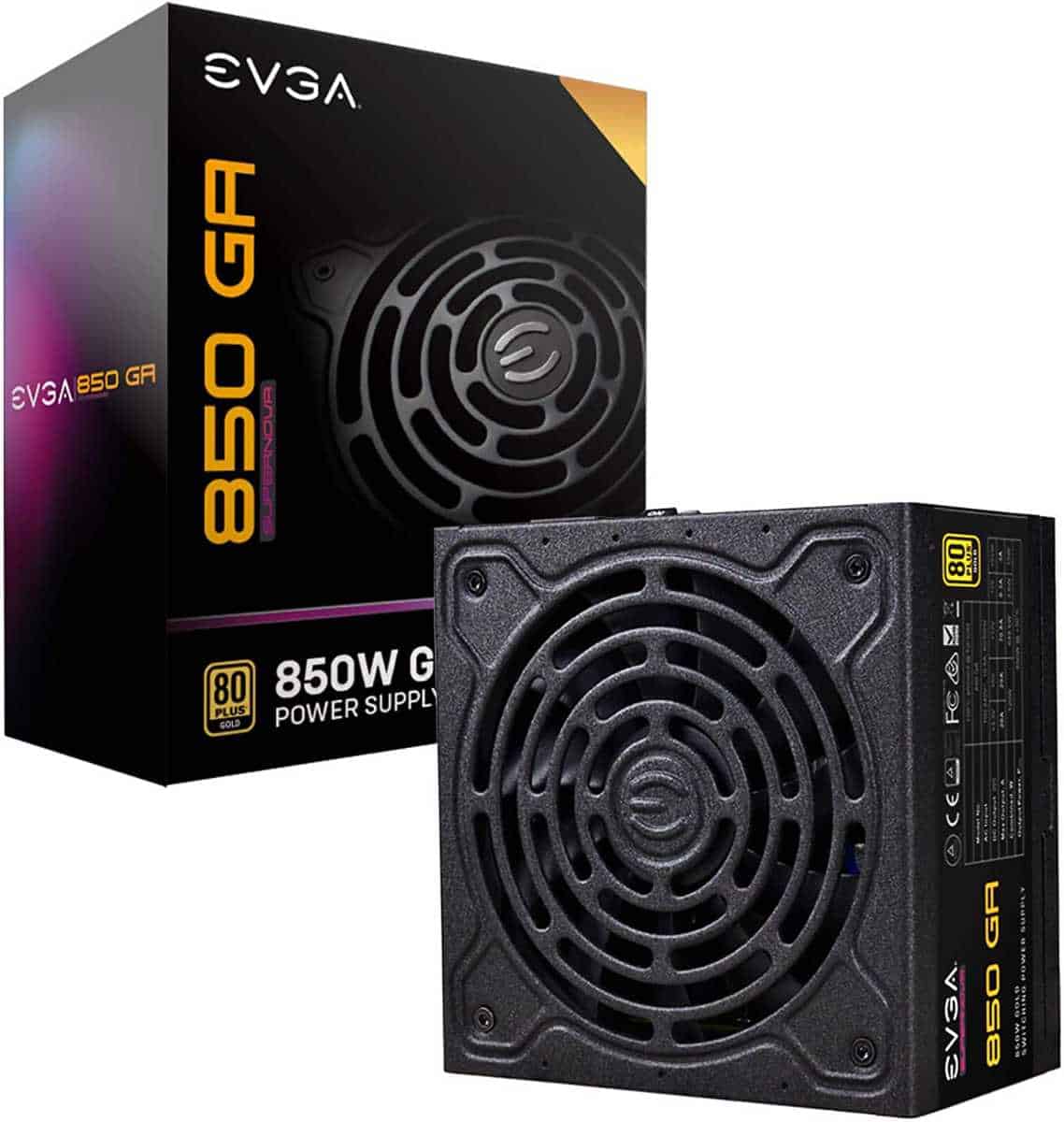
Wattage
850 W
80 Plus certification
Gold
Modularity
Fully modular
- Full modular allows for best customization and cleanliness
- Eco mode as standard
- 10 year warranty for a more trusted experience
- The more expensive option for an average spec
- A louder fan choice even with fan eco mode
On an equal leveling for the second-best power supply, we have the EVGA SuperNOVA 850 GA. Another popular and good all-around option.
The 850 W power supply is also 90 PLUS Gold rated. So although it’s not as efficient as it could be it is still a good middling selection. It also is fully modular with 4x VGA, 2x CPU, 1x motherboard, 3x SATA, and 1x peripheral connectors.
It comes with a high-quality build and components and a standard 10-year warranty as seen in a lot of options. Along with a 135mm ball bearing fan to make sure the efficiency and supply are keeping up with the work. It also has an eco mode, which will only activate the fan at 40% load to keep your noise down and durability up.
It is also priced similarly to the Corsair PSU so it comes down to availability and your preference. But the fan isn’t mag lev so it is possible for the bearings to dry or wear out and become noisier, although unlikely with the minimal noise.
Seasonic Prime TX-850
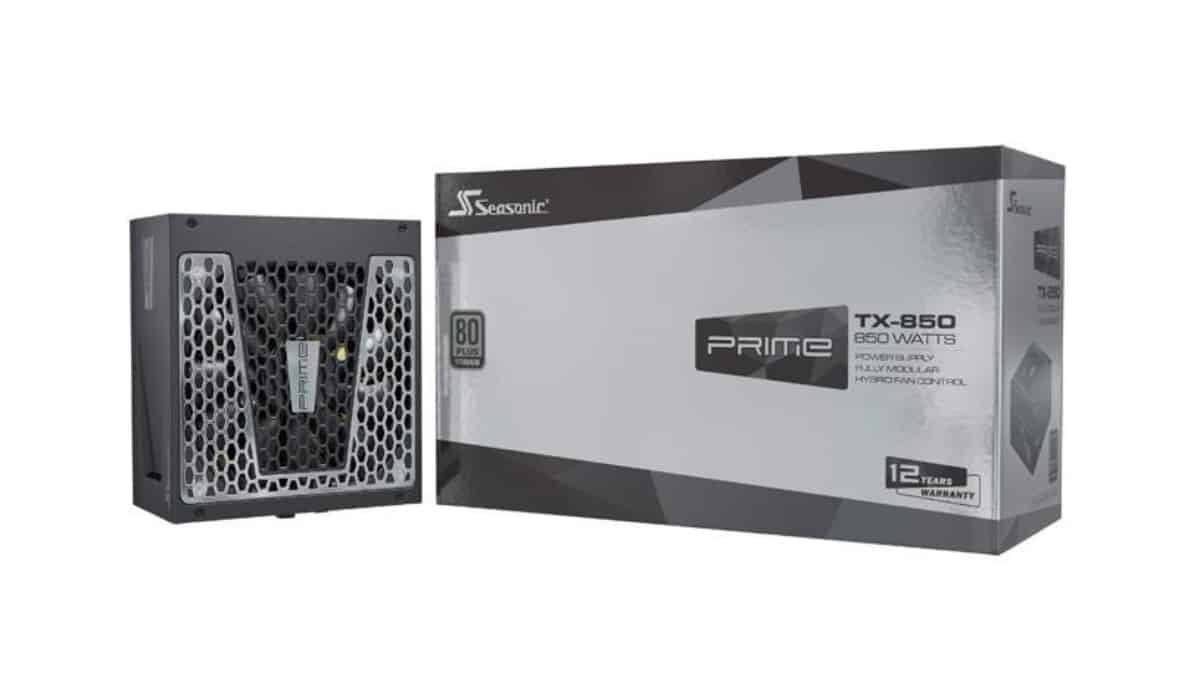
Wattage
850W
80 Plus certification
Titanium
Modularity
Fully modular
- The most efficient PSU you can buy
- Quiet operating fluid dynamic bearing
- Longest 12 year warranty that really
- By far the most expensive option that is more than most will require
For something more premium and energy-efficient, we suggest the Seasonic Prime TX-850. It is in fact one of the prime manufacturers of power supplies but itself offers top-of-the-line hardware.
Where this power supply stands out, and why it comes with a price premium is its efficiency rating. It is an 80 PLUS Titanium rating, meaning it has a 90% and higher efficiency rating across the board. Make sure all your energy use is the smallest it can be for you.
As expected it is also a fully modular supply. It offers 1x motherboard connector, 6x peripheral, and 8x CPU/PCIe. It also has a fluid dynamic fan bearing to keep the temps under control with a low noise output. While it also features a hybrid mode that only runs after 40/50% load.
It also has the longest warranty 12 years. So this one could last you a while and many builds to come. Although with the rising GPU TDPs it may not be quite enough for the more powerful options coming up.
Thermaltake Smart Pro RGB 850W
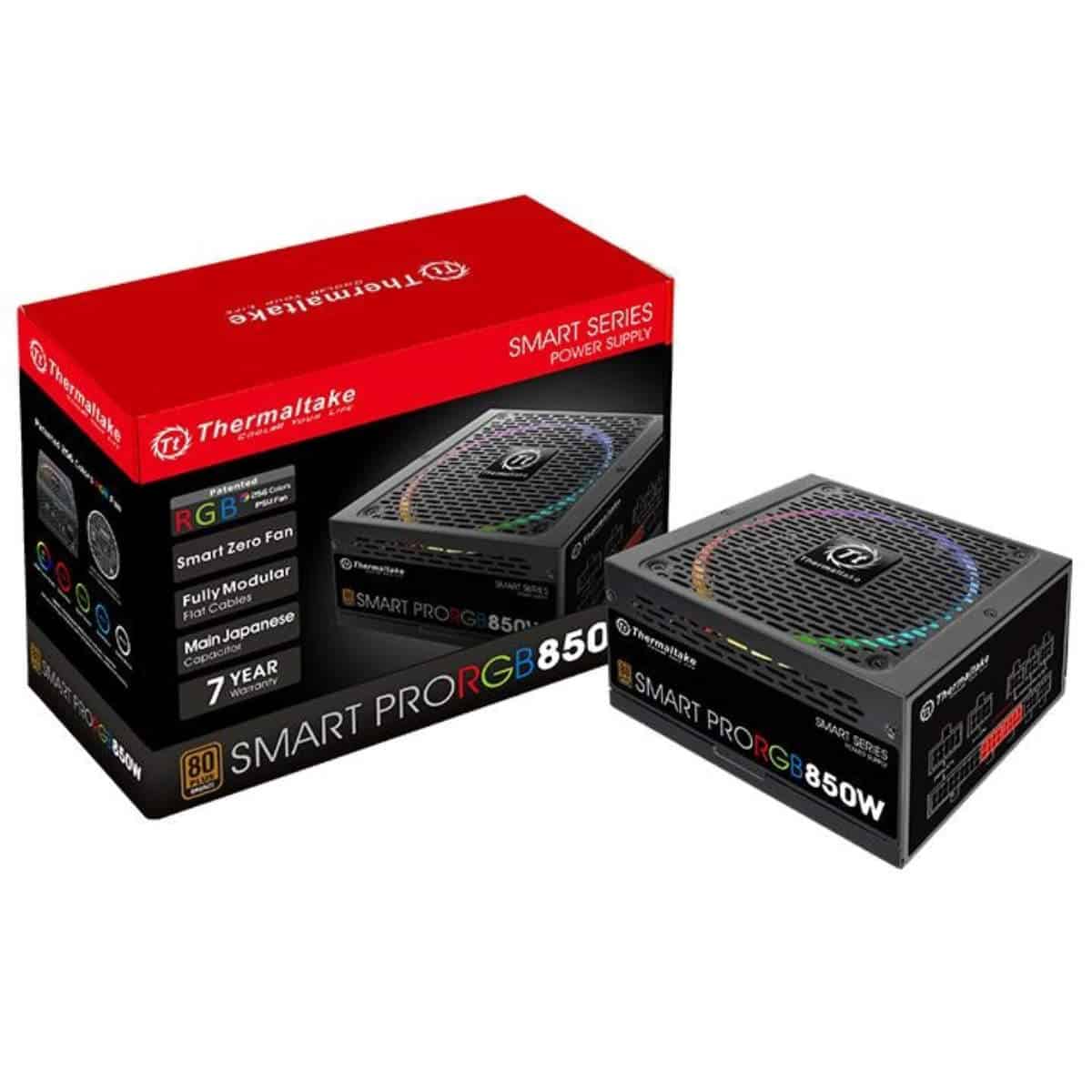
Wattage
850 W
80 Plus certification
Bronze
Modularity
Fully modular
- Still fully modular for a budget option
- A budget pic allows you to spend more on other components
- Adds some color with RGB to offer something different
- RGB not controllable
- Bronze rating does mean you lose a lot of energy from inefficiency
- Shortest warranty period doesn’t spark trust
- Fan is hydraulic and loud that might not last as long
Sometimes you just want to get the bare minimum when it comes to your dream build. But if you want to cheap out on the power supply you have to be careful of your source and manufacturer. This is because cheap knockoffs have the ability to harm and damage the rest of your build. So any reliable PSUs will still cost you something.
So for the best budget power supply for your RTX 3080 or 3080 Ti, we have the Thermaltake Smart Pro RGB 850W. The lower cost saves you initially but maybe not overtime. As the PSU does only have an 80 PLUS bronze rating. Which offers an 81-88% minimum efficiency. So even though it’s lower it’s not too big of a discrepancy with the higher ratings.
Even though it is on the cheaper side it still offers full modularity. With a choice 1x MOBO 24-pin, 1x CPU 12-pin, 2x PCIe, and 5x peripheral/SATA. It does also feature a hydraulic RGB fan, although not controllable it can add some color to your build. Which does also have a zero fan mode but a much lower threshold of 10%.
It will do its job most likely, but it does offer a lower-end 7-year warranty. It still features some of the high-end components that you can find in the other selections, just cutting costs in some other areas.
Best power supply for RTX 3080 and 3080 Ti FAQs
What power supply do I need for a 3080?
The RTX 3080 10GB/12GB and 3080 Ti all have the same recommended power supply for the system. The Founder’s Edition asks for a 750 W PSU, while the custom AIBs recommend at least 850 W. As the other options offer something extra and improved stats.
What TDP does the 3080 have?
The RTX 3080 10GB has a TDP of 320 W. Whilst the RTX 3080 12 GB and 3080 Ti have a TDP of 350 W.
Can a 850W PSU handle a 3080?
Yes, the 3080 Founder’s Edition and custom cards can easily run on 850W PSUs. Even with a top-spec CPU and the rest of the build, it should be plenty of power to supply to the system.
Can a 750W PSU handle a 3080?
The Founder’s Edition does only suggest it needs a 750W PSU to run it and the system. And so it will be plenty good for it, although some custom cards recommend a higher spec. This is to bring some safety margin to it but 750W should work fine.

